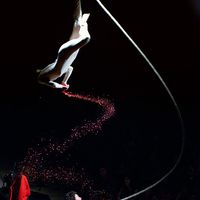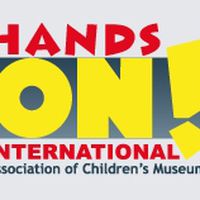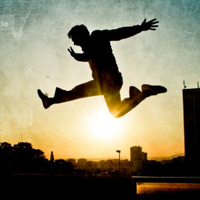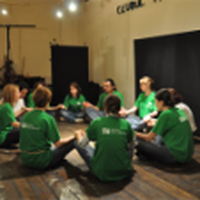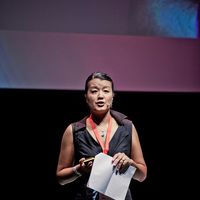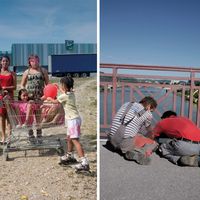From desert ... to Circus | Fresh Circus 2012
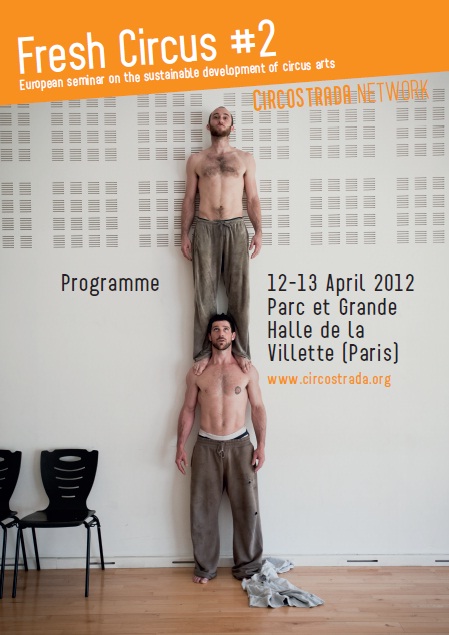
Contemporary circus, or nouveau cirque (term originally known in French-speaking countries), is a performing art developed in the later 20th century in which a story is conveyed through traditional circus skills. Compared with the traditional circus of the past, the contemporary approach uses rarely animals in shows and tends to focus more on the overall aesthetic perspective, on character and story, and on the use of lighting design, original music, and costume design. In this sense, contemporary circus combines circus elements like acrobatics, juggling, trapeze and aerial silk with contemporary dance, music and theatre skills.
Contemporary circus is more developed in European countries such as France, Italy, UK, Sweden and Netherlands where it is represented in schools, private companies, festivals and where it benefits from different financing mechanism to incentive the creation of new shows. In the rest of Europe the understanding of this art form is still underway and different shareholders are looking for ways to create opportunities for contemporary circus to be performed and developed.
In Romania a few events have taken place recently, such as the 2011 edition of the International Sibiu Theatre Festival, the presence of the contemporary dance and circus Raoul – written and performed by James Thierree, the 2011 edition of European Festival of Performing Arts in Timisoara. However, a real strategy has not been created yet by national bodies in order to foster this niche art form in Romania.
In this context, Fresh Circus, a European Seminar on the sustainable development of circus arts organized by Circostrada Network and coordinated by HorsLesMurs, provided 2 days of intense discussions about the current situation of circus arts and its new perspectives. The seminar took place in Paris on April 12 to 13; it brought together an interesting mix of lectures and working sessions about funding, development, cultural management, for active professionals in circus arts and evening performances on the status of circus arts in today’s society.
The seminar aimed at bringing together the professionals in circus art, but also at creating the right environment for discussions about this art form and its future development. The final goal being, to formulate a series of practical recommendations to improve the infrastructure and recognition of the sector.
During the first session of the seminar, Yohann Floch, the coordinator of Circostrada Network noted that the name Fresh Circus defines what is new, interesting, emerging, but it is also a way to integrate the sustainable development of circus so as to “meet the needs of the present without compromising the tradition”.
I had the opportunity to interview Yohann Floch during the course of the Seminar. Here are some of his views on the status of contemporary circus today.
(Florentina) We talked a lot about sustainability in the field of circus arts during the seminar. What are in your opinion the positive aspects of today’s circus practices? And what are the key elements from which a sustainable circus arts can grow?
I believe sustainability is not another box an arts organization should tick, it's more a vision, a way to be aware of the role your daily work and artistic practice have. It is also a process, thus a way to take into account these 3 key elements of sustainability: environmental responsibility, economic health, social equity.
Arts and culture feed other dimensions and are fed by them. Far from the idea to reconnect arts and culture to society (they are definitively part of it, the fourth and central "pillar" of a sustainable development), talking about the concept of sustainable development is a good way to question our values: sustainability generally refers to the capacity to "adapt" to changes or new situations, including crisis... But what are the values we stand for? Economic values only? We indeed have the capacity to adapt and change... but for what project of society?
(F) Another recurrent concept during the seminar was networking. In your opinion, what are the best generating networks – at European and world wide level – in which a small circus art company can enter to gain visibility and support?
I would say it's important for the performing arts sector to meet and exchange, especially for the contemporary circus sector which has really few opportunities to network. There are no big gatherings such as Fresh Circus and even if some festivals and venues try to organize meetings for professionals, we don't have many opportunities to meet colleagues, artists, producers, promoters and reflect on the circus community.
(F) After attending the performance Ivan Mosjoukine: De nos Jours it became very important for me to start thinking about a project that would bring – promote circus arts in Romania. How is the Circostrada Network helping the existent and emerging actors in circus arts?
The Circostrada Network does a lot to promote circus and street arts in Romania and Europe, members are really committed to develop the sectors and work beyond their own interests - which is rare and valuable. We created many tools (online & free of charge) such as guides and directories, database, proposing reviews and articles in English, designing seminars and info sessions for critics or arts council’s officers.
National info centers such as Circuscentrum (BE), HorsLesMurs (FR), propose as well magazines, dvds, tips and advice to help project managers find the best ways to achieve their projects.
(F) Will the results of the meeting be available online?
Yes, the results of the Fresh Circus #2 seminar will be published in the summer together with the presentations proposed by the speakers.
Twenty years after the signing of the Maastricht Treaty, which allowed the European Union to function in a cultural capacity, Anne-Marie Autissier, sociologist of culture and Director of the Institute of European Studies at the University Paris 8, summarizes the present situation of contemporary circus at Fresh Circus #2.
“Contemporary circus is experiencing a lack of legitimacy in different parts of Europe. We need to create comfort zones for circus arts professionals to get training and to be able to create”.
More on:
- Hors Les Murs: http://www.horslesmurs.fr/
- Key notes speakers at Fresh Circus 2: http://circostrada.org/IMG/pdf/Programme_Fresh_Circus_2_EN.pdf
- Also about contemporary circus in Europe: https://culture360.asef.org/magazine/contemporary-circus-in-europe/
Florentina Bratfanof has worked in the theatre field in Romania for the past 10 years, first as a Press Officer for ACT Theatre, the first independent theatre in Romania, then from 2006 as a cultural journalist for online magazine, www.121.ro. In 2008, after obtaining a master diploma in cultural management in Belgrade, she has been involved as well in the Press Office of several international theatre festivals: Romanian National Theatre Festival, Bucharest, Romania (2008-2010); “Underground Arad Fun” Festival, Arad, Romania (2009); 36th International Festival of Alternative and New Theatre, Novi Sad, Serbia (2009), “George Enescu” International Festival and Competition, Bucharest, Romania (2009). From 2009 to 2010 she was Artistic Consultant of Odeon Theatre, Bucharest. In parallel, from 2009 till present, she helped growing Scena.ro magazine (www.revistascena.ro) in terms of PR, distribution, also contributing with articles and interviews. Currently she holds the position of PR Manager of Romanian Association of Performing Arts (RAPA), but she is also Talent Scouter for Media Pro Pictures.
Similar content
10 Mar 2010
from - to
13 Apr 2016 - 15 Apr 2016
15 Nov 2011
01 Feb 2012

